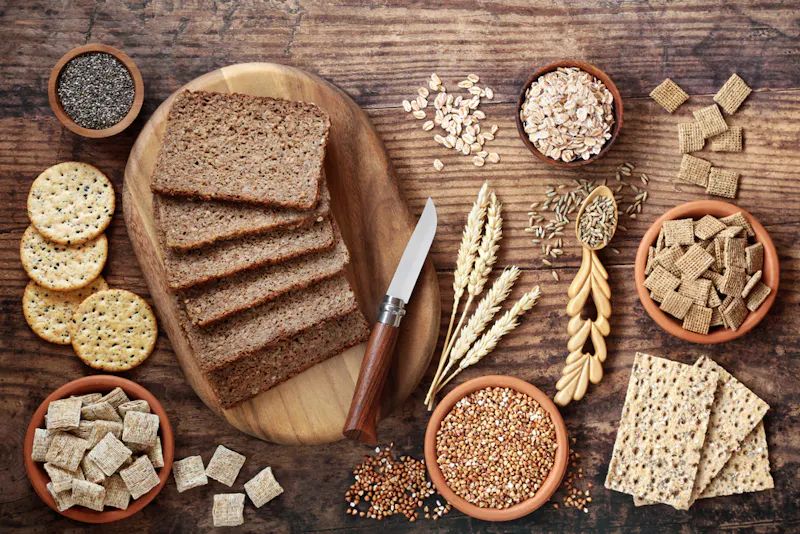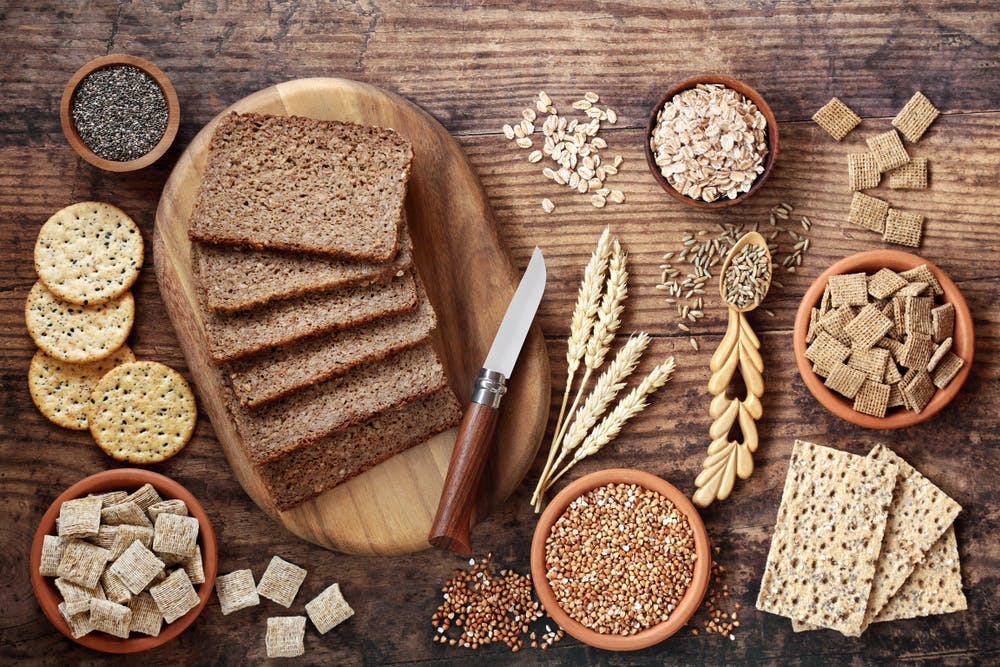What are whole grains?
What's covered?


Whole grains are nutrient-rich seeds from cereal plants — like brown rice, oats, and quinoa. Eating a diet high in whole grains is linked to a wide range of health benefits, like a lower risk of heart disease and stroke. There’s no recommended intake in the UK, but most experts recommend three portions a day.
What are whole grains?
Grains are the seeds from cereal plants. A grain is considered a whole grain if it still contains the three original parts:
- the bran — the fibre-rich outer layer
- the germ — the nutrient-rich inner part (embryo)
- the endosperm — the starchy centre which acts as food for the germ
Types of whole grains
There are many types of whole grains, including:
- wheat — including spelt and durum
- brown and wild rice
- oats
- quinoa
- buckwheat
- bulgur
- barley
- corn
- rye
If you have coeliac disease or follow a gluten-free diet, brown rice, quinoa, uncontaminated oats, and buckwheat are good gluten-free wholegrain options.

Nutrients found in whole grains
Most of the nutrients in grains are found in the bran and germ. Whole grains are good sources of:
- fibre — mainly in the outer bran layer
- B vitamins — like folate, niacin, and thiamine
- minerals — like iron, magnesium, and zinc
- protein — can contain up to several grams of protein per serving
- antioxidants — like vitamin E and selenium
- essential fatty acids — like omega-3s
Health benefits of whole grains
There’s a lot of evidence to support eating a diet high in whole grains.
Chronic disease and whole grains
A diet high in whole grains is linked to a lower risk of developing a range of chronic diseases. For example, it might lower your risk of heart disease, stroke, and type 2 diabetes by as much as 30%.
It might also lower your risk of some types of cancer, particularly bowel cancer. This is because the fibre in whole grains can help move food through your large intestine more quickly — reducing how long damaging substances can interact with your gut wall.
Gut health and wholegrains
The fibre in whole grains helps to bulk out your stool, helping prevent constipation. And some types of whole grains, like oats, are prebiotics — promoting the growth and activity of ‘good’ bacteria in your gut. So eating a lot of whole grains can improve your gut health and digestion.
Weight and whole grains
The high fibre content of whole grains can keep you feeling fuller for longer. This can stop you from over-eating — helping you maintain a healthy weight.
Whole grains also have a low glycaemic index (GI). This means they’re slowly digested and stop your blood sugar levels from rising and falling quickly (which can happen with refined grains).
Tips to eat more wholegrains
There’s no official recommended intake of whole grains in the UK, but many experts recommend at least three servings a day.
Here are some tips to help increase your intake of whole grains:
- swap refined grains, like white rice, couscous, and white bread, for wholegrain versions
- substitute white flour in recipes for wholemeal flour (or try half and half)
- add grains like brown rice or barley to soups and stews
- choose wholegrain snacks like oatcakes, rye bread, and unsalted popcorn
Other types of grains
Other types of grains include refined grains and enriched grains.
Refined grains
Refined grains have the germ and bran removed — to create a finer texture and to extend the shelf life. Examples of refined grains include white flour, white rice, and white bread.
The refining process removes many of the nutrients found in grains. In fact, whole grains can contain up to 75% more nutrients than refined grains. So it’s a good idea to try to opt for whole grains most of the time.
Enriched grains
Enriched grains are refined grains that have nutrients added to them. This helps to replace some of the nutrients lost in the refining process — like B vitamins and iron. But the fibre isn’t replaced.
If choosing a refined grain, try to find an enriched one — ‘enriched’ will usually be listed in the ingredients list.
Aune, D., Keum, N., Giovannucci, E., Fadnes, L. T., Boffetta, P., Greenwood, D. C., ... & Norat, T. (2016). Whole grain consumption and risk of cardiovascular disease, cancer, and all cause and cause specific mortality: Systematic review and dose-response meta-analysis of prospective studies. BMJ, 353, i2716.
BDA: The Association of UK Dietitians (2019). Food Fact Sheet: Wholegrains. Retrieved 25 November 2019 from https://www.bda.uk.com/foodfacts/wholegrains.pdf.
Wu, H., Flint, A. J., Qi, Q., Van Dam, R. M., Sampson, L. A., Rimm, E. B., ... & Sun, Q. (2015). Association between dietary whole grain intake and risk of mortality: Two large prospective studies in US men and women. JAMA internal medicine, 175(3), 373-384.